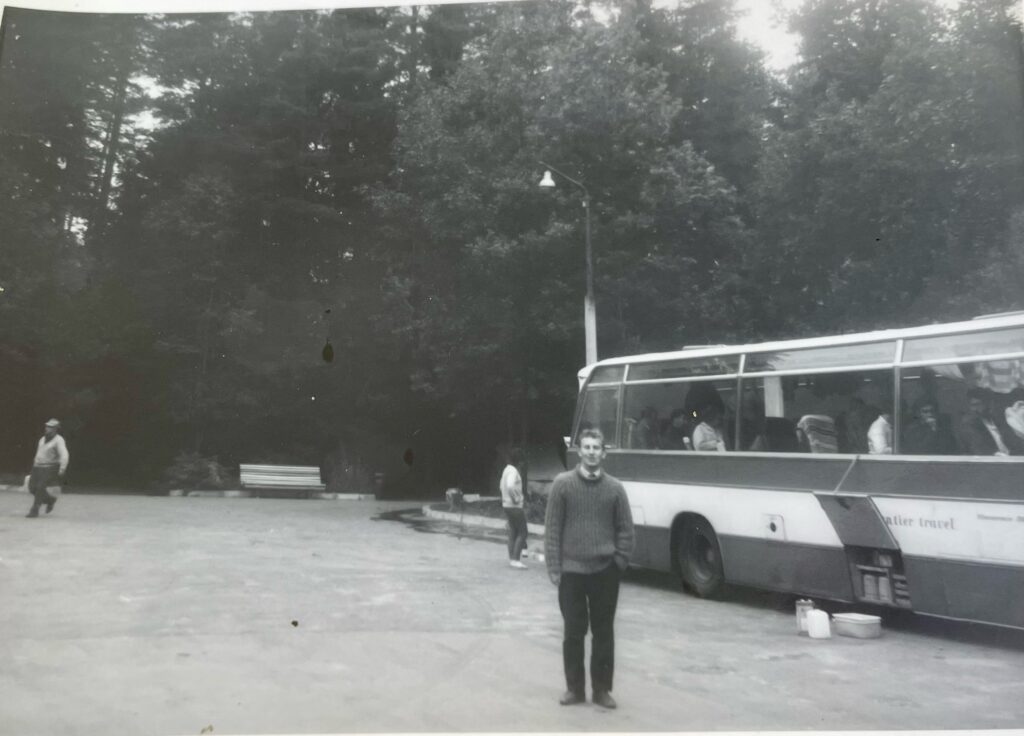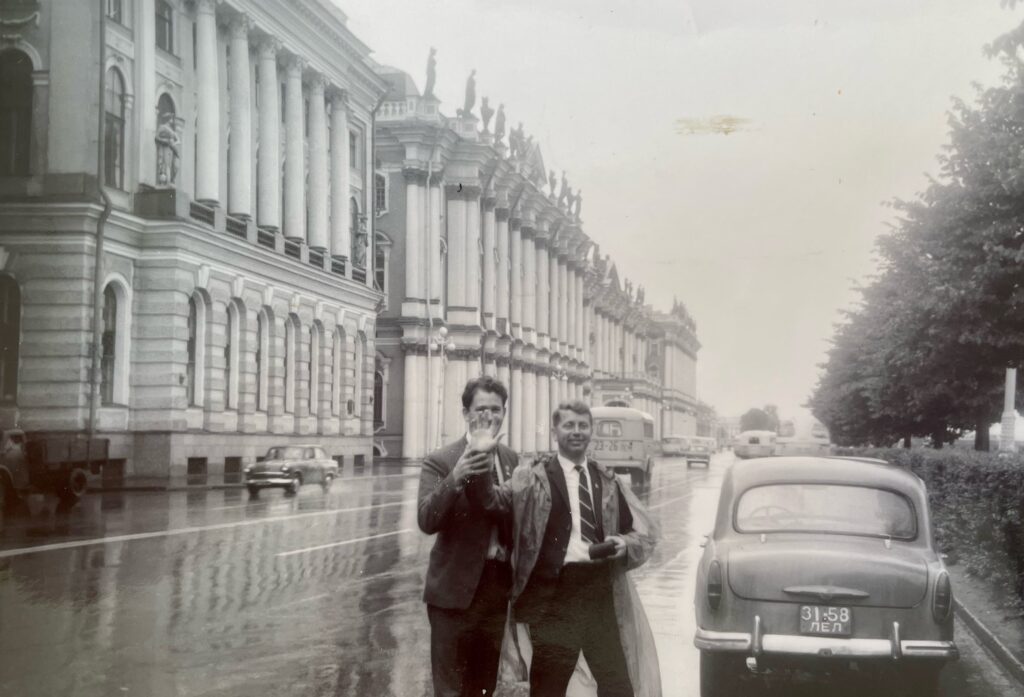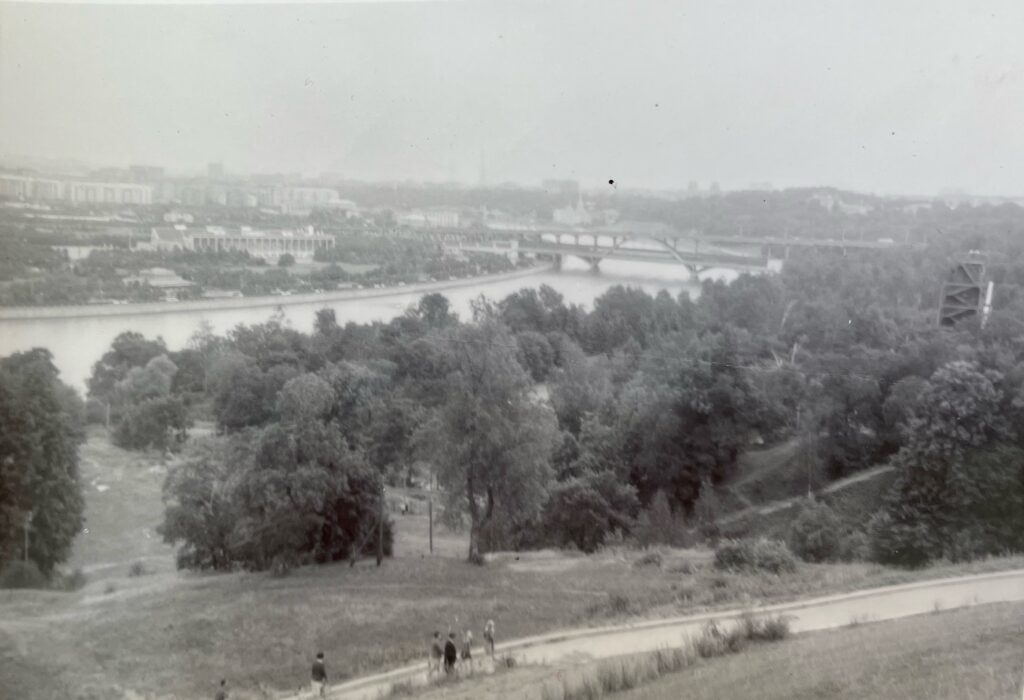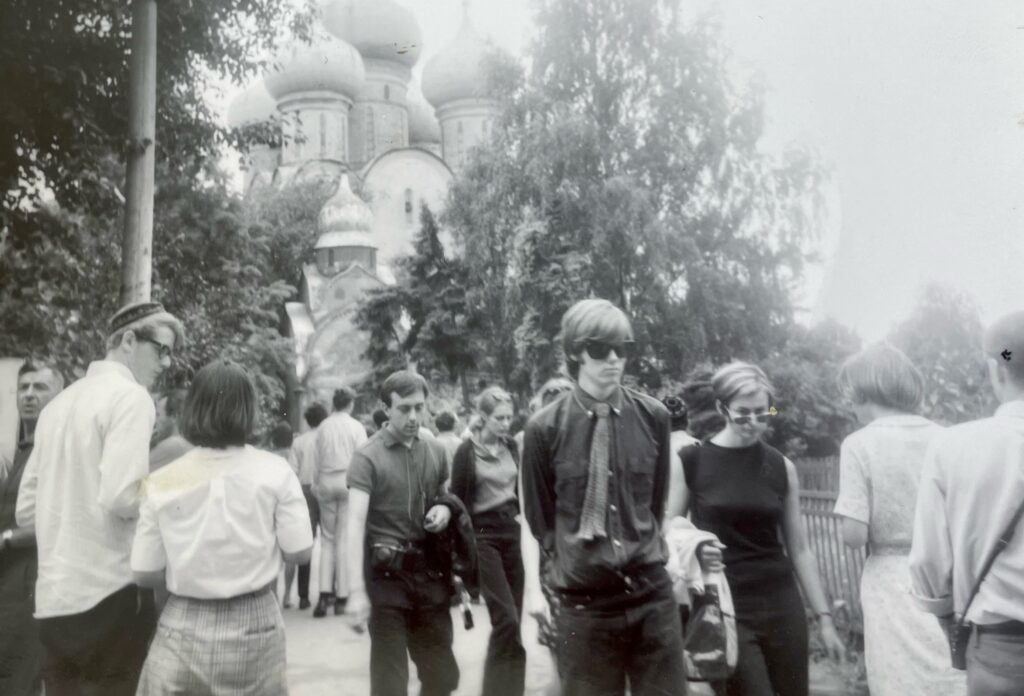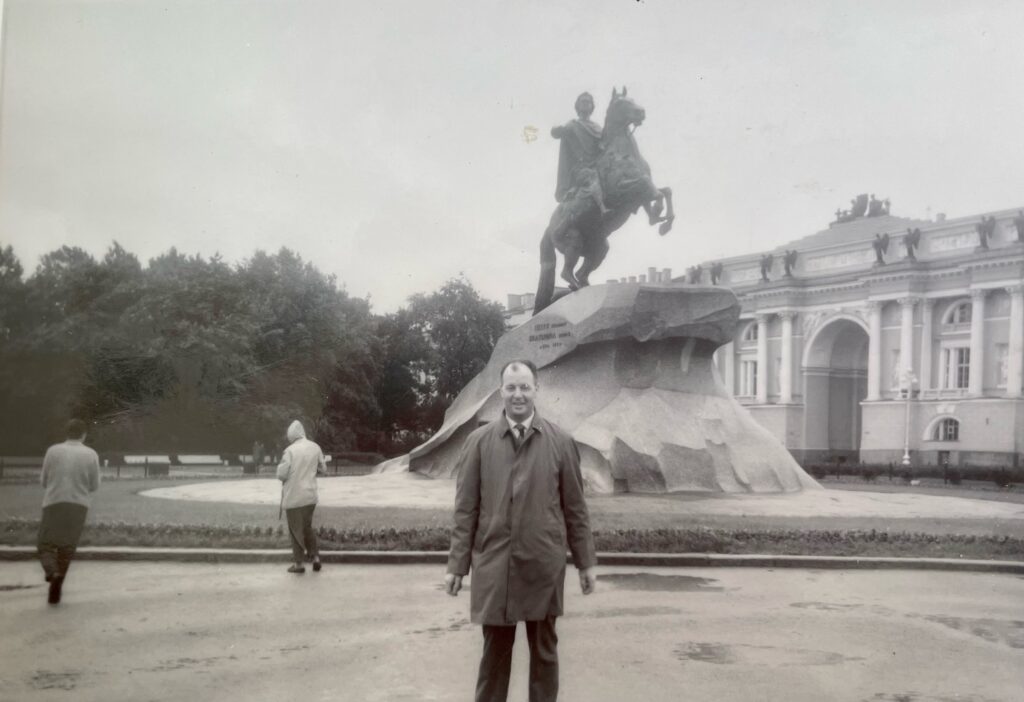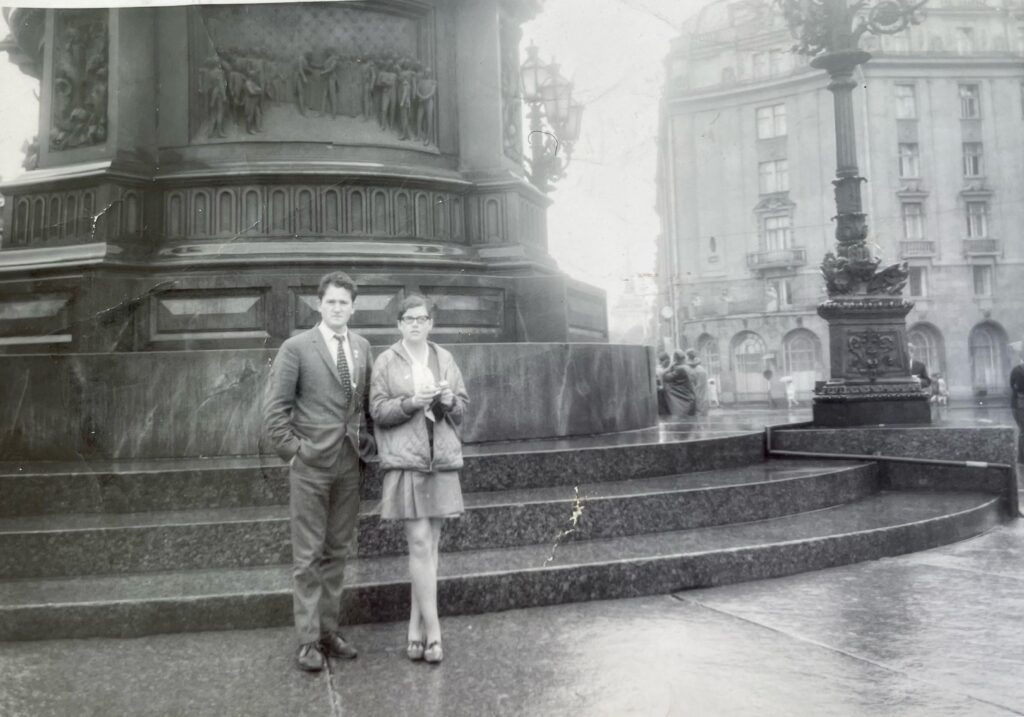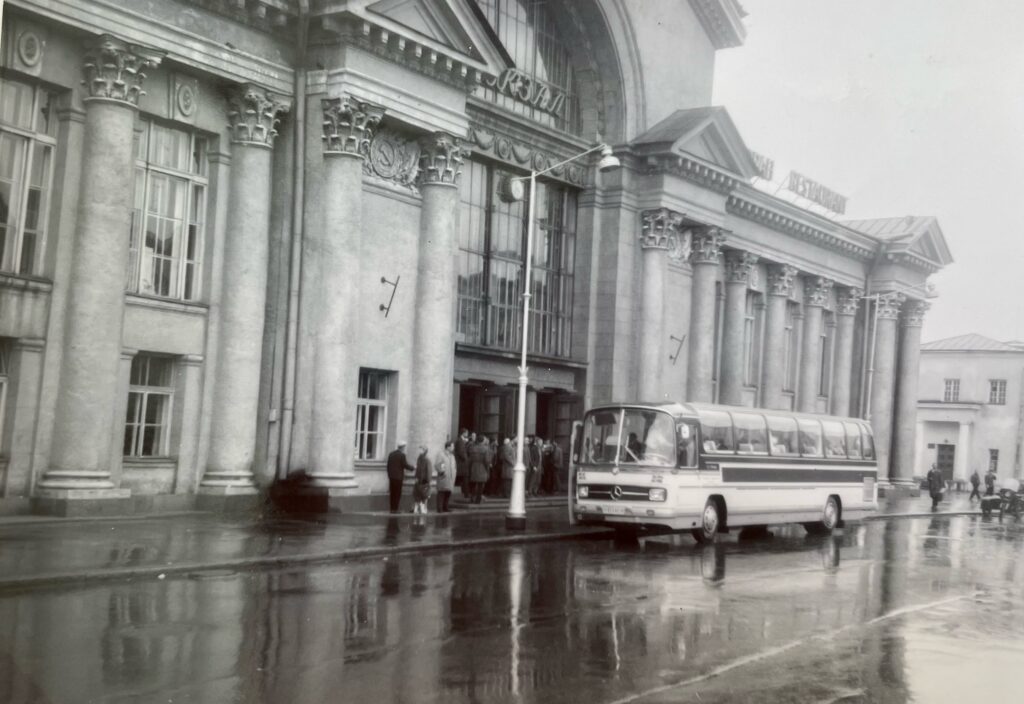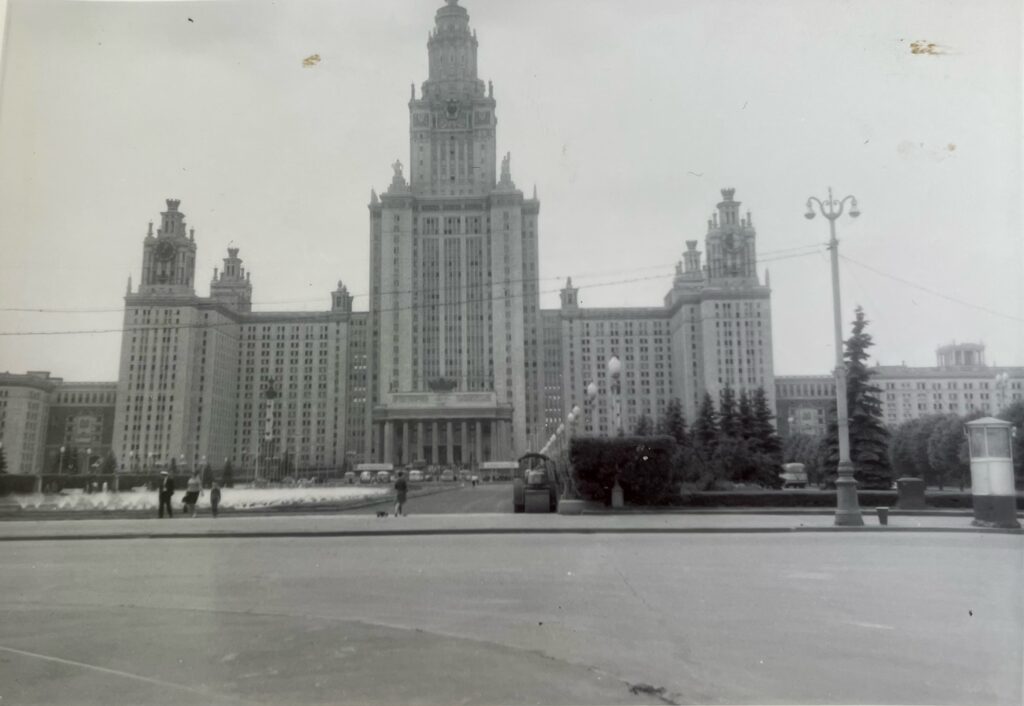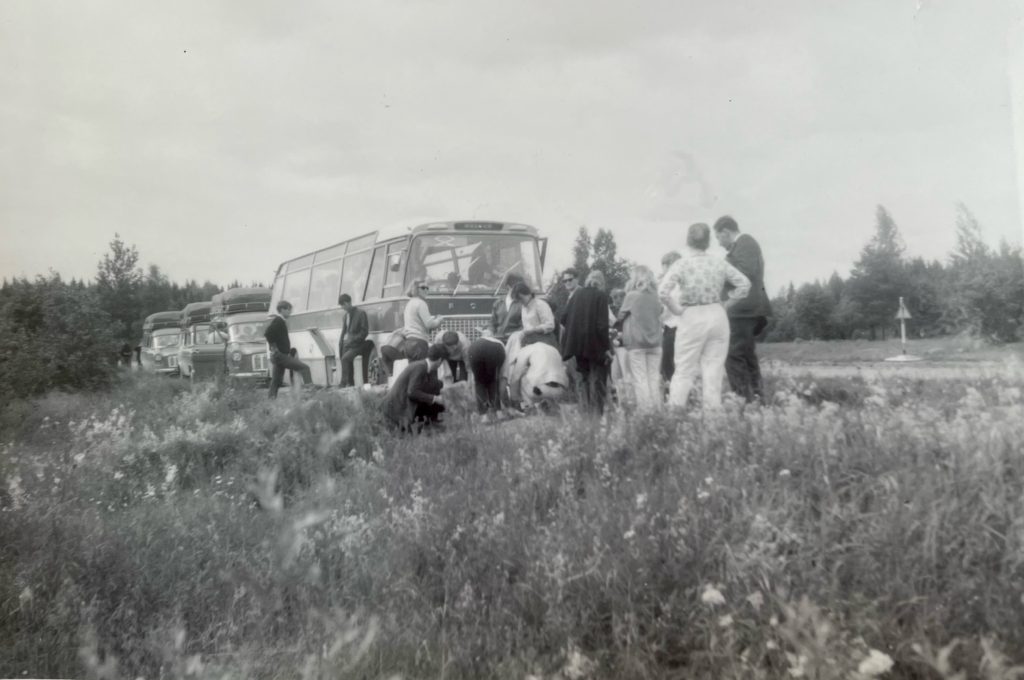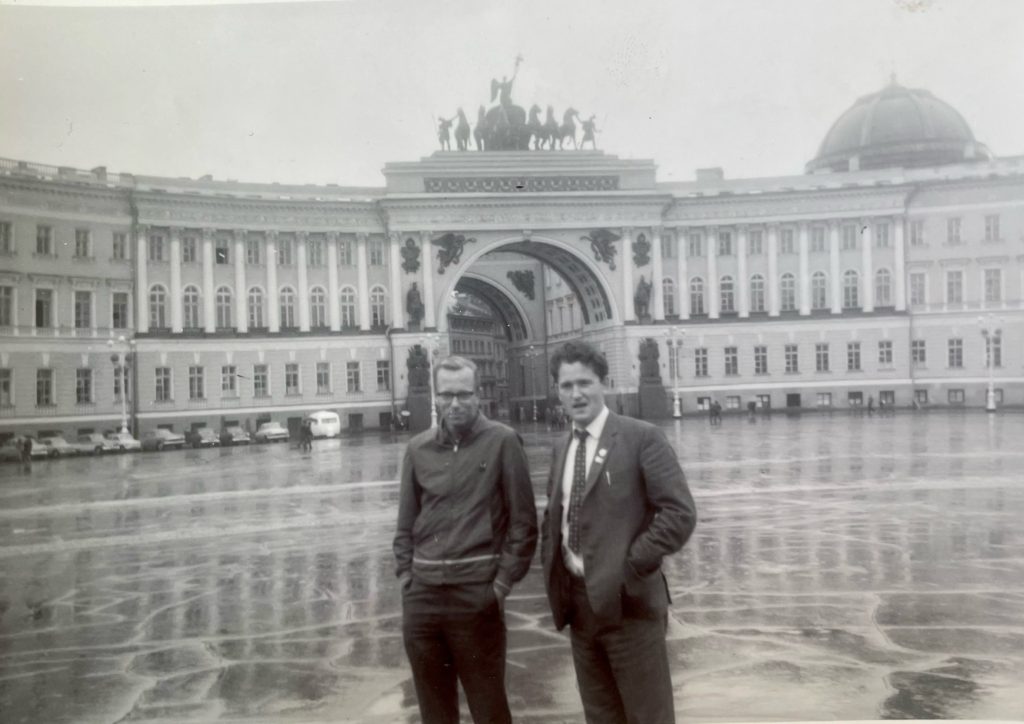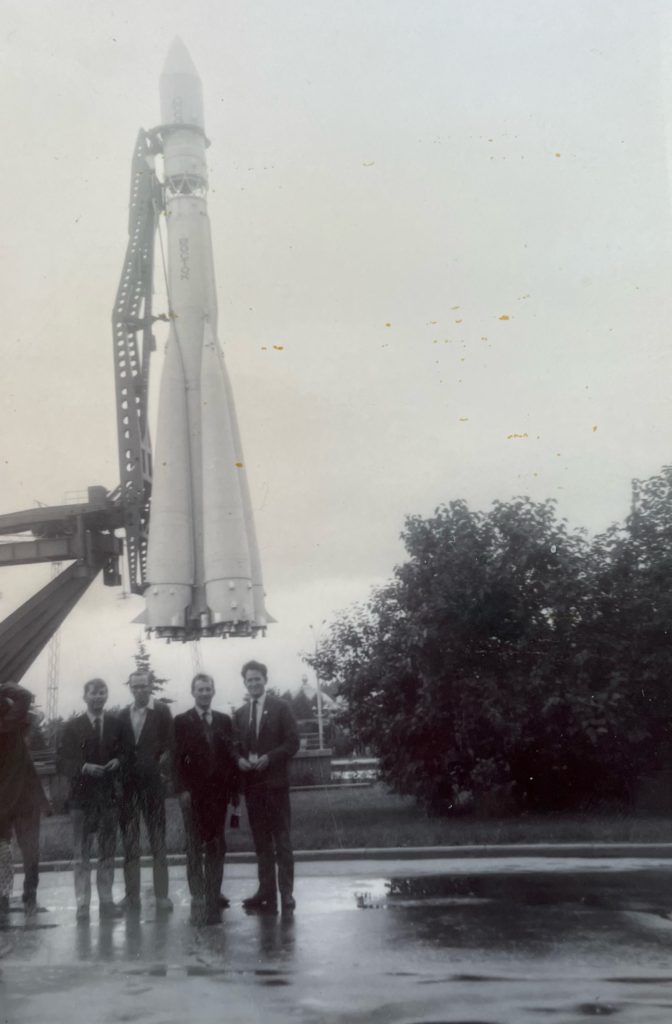Blessington to Moscow 1968
Playing a round of golf with the late Con Doyle of Baltinglass in April 1968 we got talking about holidays. With a few friends he was organizing an overland trip to Moscow the following July. He invited me to join the group which I gladly did.
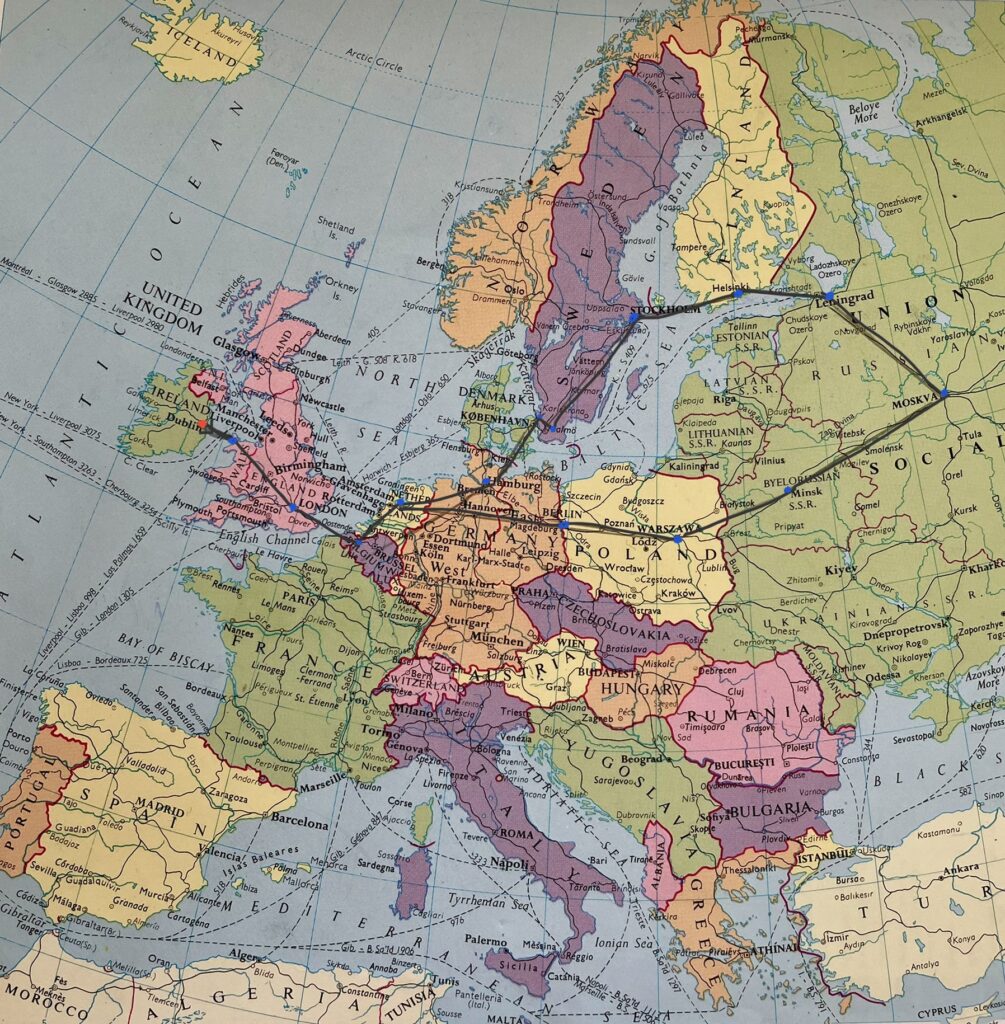
In London I purchased a few items for the journey, a case, sleeping bag, cushion, sports shirt, plastic raincoat, soap, toothpaste, shaving stick-I had already most of what I needed. London was busy and hot.
Friday 5th July : At 7.30 our coach departed from Victoria Coach Station for Dover and the crossing to Zebrugge.
Saturday 6th July : In Zebrugge it was pouring rain. We reached camp in Amsterdam at 4 p.m. We were starving. We asked the concierge about our tent. He pointed out to a lake a foot deep in which was our abode for the night. We remonstrated but to no avail. Fortified by duty free we rolled up our trousers and tried to figure out how this thing had been assembled and then how to take it apart. Never having been in the Boy Scout movement we struggled on –valiantly but to little avail. We then realized that the ropes were held in a vice-like grip by metal pegs. Loosening these pegs was difficult. After much swearing-yes swearing -we got our tent on dry land and erected it. After that ordeal we felt entitled to go into Amsterdam and celebrate our achievement.
Sunday 7th July : Departed at 8.30 a.m. for Hamburg. Drains, tillage, red brick houses and windmills. (Amsterdam has 100 canals and 400 bridges.) The North Sea Dam across the Zuider Zee is 19 miles long. German border, German efficiency, no drains now, a few windmills, great autobahnen. Hamburg’s red light district has joints with shop-window call girls. How humiliating for them! Later we went to Zillertal for a typical night’s singing of German songs and the drinking of litres of German beer. Some enthusiasts got up on the tables; a few tried to abscond with the litre mugs. (Great to be young!) Camping at Stillhorn.
Monday 8th July : Left camp at 8.15 a.m. Into Hamburg, then from Puttgarden by ferry to Rodbyhavn in Denmark. There were trains and many coaches and cars on this ferry. Later we went into Copenhagen and visited the Tivololi Gardens. Prices were prohibitive.
Tuesday 9th July : All day long tour of Copenhagen. Saw the iconic mermaid seated on a rock a little out in the sea. Her head had been cut off some time recently by some pranksters. Saw a small Eskimo man near Christianborg Palace. Visited Tuborg Brewery in the afternoon and partook of a few lagers compliments of the house. That night we had a singsong around the campfire.
Wednesday 10th July : I help with cooking- in fact dishing out tinned food and making squash. Left camp at 7 a.m. and crossed by ferry to Helsingborg in Sweden, a very short voyage. Stopped for lunch at 12.00, which consisted of bread, squash, pickles, beetroot etc. Trees abound in Sweden. Continuous showers. Reached Stockholm at 6.30. So many bridges and flyovers. We just seemed to keep driving through the city. Went into the city that night, but found prices exhorbitant.
Thursday 11th July : We had breakfast at 8.00 and had a free day in the city. Sat in main square for 1 hour to watch the world go by. Yielded a Krona to a toucher. Watched the impressive changing of the guard at the Palace. Each guard was armed with a sten or bren gun. Sweden has the best record of industrial relations in the world, strikes being very rare. A brassband marching in formation. Falling out on the double. Saw Catholic church with many tombs. Also Lutheran church. Visited the National Museum with paintings by Goya, Van Dyke, Rembrandt, El Greco etc. Sat at roadside café opposite the palace on the other side of the river. Wrote letters home. Then listened to a protest meeting against the visit of Russian Prime Minister Kosygin the following Saturday. Two people spoke in English. One, an American, speaking as a private citizen domiciled in Stockholm, spoke of the lies perpetrated by Communists, suggesting that Sweden was on the list to be taken over by the Russians. Russia according to him, was really the imperialist power. America had her investments but these were welcome in the respective countries. A demonstrator is dragged out by the Polis. Ate 2 hot dogs. Changed £5 sterling into Krona. Met a Swedish sailor in the railway station buffet. Later he was interrogated by the Polis. Walked around Stockholm for an hour and back to the station.
My impressions of Stockholm are that it is rich, clinical, friendly and with much concrete. The women are fair, tall, slim, fabulous and cheerful. The climate is akin to our own, the sun a little hotter and not as dark at night. There is great growth in the country especially with trees. It is a multilingual society with German, Swedish, English and Danish being spoken. The government is social democrat since 1936. The present Prime Minister is in office since 1946. The country has a leaning towards Russia as it is a socialist state. There has been no war in 136 years. Neutrality is prized here, as in Ireland. (Remember the campaigns of Gustavus Adolphus in the 17th Century – but those days are well past!) The Swedes managed to maintain relation with Germany during WW2. Religion is 97% Lutheran. They have the best industrial relations in the world. Strikes are rare. A father, by law, must support his child even when not married to his child’s mother. No stigma attaches to illegitimacy. Old people are well looked after. Cars are not flashy. You could say that Sweden is a very rational society. Leaflets were handed out to enforce the American’s case. (Later, when entering the Soviet Union, we were warned by our bus driver to be rid of this possibly subversive material. We chucked any leaflets we had out the window.)
Friday 12th July : We are now on a luxurious ferry boat for Helsinki. This morning we got up at 8.00. It was pouring rain. Stockholm at 10.00. We visited the huge recently completed radio tower overlooking Stockholm. It is a beautiful sight like something out of a story book. We had the usual lunch and then on to see the famous Wasa Warship in the Maritime Museum, launched in the 17th Century. She sank almost immediately and was luckily protected by mud and silt. The Museum holds some terrific wood carvings.
Saturday night 13th July : Look around Helsinki. Met an interesting Finn in a restaurant with perfect English. He talked about the friendly relations between Finland and Russia. You could see that he chose his words carefully. He knew much about Ireland and her playwrights. I mentioned Shaw’s response to a lady in London society. An invitation was delivered by hand to his place of residence. “Lady So & So will be at home on Tuesday next at 7 p.m.” Shaw responded in the briefest manner with the following, “So will Bernard Shaw.” In fact my acquaintance had heard of the put-down. He said that interracial relationships with the Lapps were very good.
Sunday 14th July : Left camp at 7 a.m. Arrived at the Russian border at 11 a.m. It took 2 hours to get past. Our bus had been searched very carefully by border guards. Passports scrutinized. Just as well we did not have those ‘counter-revolutionary’ leaflets. We each filled in a form declaring how much currency we were taking into Russia. Lucy, our guide while we were in Russia joined us. You could see she was a superior sort, well educated in the way of ‘our country’ and possibly a member of the Communist party.
Monday 15th July : To day Lucy gave us a tour of Leningrad. We saw, from our bus, the magnificent Winter Palace, home to the Tzars for 300 years until 1917. We were reminded of Bloody Sunday 1905 when the witless Nicholas 11 ordered the Cossacks to break up a peaceful demonstration by poor people begging for food. It was probably the beginning of the end for royalty. Also the Peter and Paul fortress a well known prison. Within its walls is the Peter and Paul Cathedral where many of the Romanoffs are buried. (Lucy gave us some facts about conditions in Russia and WW2, which had ended a mere 23 years ago.)
Siege ofLeningrad : 632,000 died from starvation. !,000,000 died altogether. The people had no electricity or water. They were rationed to 1/4 lb. of bread each day. Even so a new theatre was opened. Private books were burned for heat. A symphony was composed in Leningrad, “Winter 1942-‘43”. The River Neva was iced over. On Lake Ladoga the ice was 6” in depth. Lorry drivers worked 18 hours a day bringing supplies to the city over this lake. With the coming of Spring the ice started to melt but the drivers kept going. Some trucks sank and many drivers were drowned. The German Wehrmacht was defeated and 300,000 surrendered. Leningrad was relieved. Monuments had been protected by sand bags and some were buried. At Nurenburg the Germans claimed that they were not going to destroy buildings of architectural value. It took only 4 years to reconstruct the city.
Social Conditions : Health service is free. While in hospital a person is paid. Women get a pension at 55 years of age, men at 60.There is no contributory scheme. It depends on the number of years worked. A full pension is granted after 25 years. Coal miners retire earlier. Invalids get 100% pensions. Adoption like our own is legal. Illigitimate children are looked after by the state. At 1 year there are nurseries for children while their mothers work. Euthanasia is not legal. Abortion is and is free. Peter the Great ensured wide streets in Leningrad. Not so with Moscow which is older and unplanned. In regard accommodation, a single man is entitled to 1 room and a kitchen; married with 1 child 2 rooms and a kitchen; a larger family 3 rooms and a kitchen.
Divorce is simply got but you must have a good reason, such as an inability to have children, or doing time in jail. The cost for same is 20 roubles and it takes about 2 months. Children stay with their mothers. At death services are held for important people, cremation sometimes practiced. Unbelievers are just buried. There are not many believers now. Only 19 churches open in Leningrad. By Soviet decree Church and state had been separated in the New Government. Most believers are elderly people.
Industry works 7 days a week. Workers get 2 days off a week. Stores are open 7 days a week. Paper sellers and ice cream sellers are paid a salary by the State. (One can only imagine the amount of administration involved, and the tons of paper.) Lenin seems to have taken the place of God. Newspapers are full of letters of complaint. Popular authors are Shakespeare, Steinbeck and Twain. Kennedy was very popular. Women get the same pay as men, have the same property rights and can be members of the Communist Party. Most doctors and teachers are women. That night some of us opted to go to a circus. Our more discerning brethren chose a performance of the Bolshoi Ballet.
Tuesday 16th July : This morning we left camp early to visit the beautiful Hermitage Museum with all its gold and great paintings. Later our guide answered questions.
Taxes : Income Tax is between 7% and 13%.There is an extra tax of 6% on childless couples. The government in Russia is on a Soviet system. Each town or country district has a soviet. Then each region, then State and finally the Supreme Soviet. A kremlin means a wall- for example Moscow, Novgorod and many more have their own kremlin. Lucy told us a story about Ivan the Terrible and an eyeless bell. Ivan the Terrible was making his way to where St Petersburg is now situated. This involved crossing the River Neva. As he crossing the wooden bridge he was seen by the caroller in a monastery on the other bank. To welcome his important visitor the caroller started up ringing his bell. Unfortunately Ivan’s horse reared up and Ivan landed in the river. He was fished out by his cohorts. In a rage he ordered that the bell caroller be thrown from his perch and that the eye should be cut off the bell so that it would never ring again. In education the emphasis is on the technical and scientific side. There are no pubs as we know them. Vodka, beer and cheap wine can be bought in shops. Restaurants are few – people eat at home.
Wednesday 17th July : Our camp at Novgorod is low-lying and swampy. Mosquitos abound here as the air is very humid. Some miles outside Novgorod yesterday we saw some huge blocks of flats-very drab. Also lines and lines of gray coloured small trucks, very few cars. It reminds me of gold rush days in Alaska. Now the sun is very hot. I spoke to a man from Estonia. He seemed very national minded, a dangerous emotion in this land. Yesterday I spoke in a manner to 3 labourers at a stop near Novgorod. Their cigarettes had unusually long tips so that they could be held in winder in gloved hands. Last night we had bought a bottle of vodka and had a sing-song. We are now moving off for Moscow, about 320 miles, a journey of 10 hours. So far our impressions are that the towns built by the tzars have great wealth. The ordinary people haven’t much. The standard of living is very low. Everybody talks about Art and the Revolution. Maybe there is another revolution coming. I would think the people are not happy. In places the country is sparcely populated and much of the land lies idle. The roads are reasonably good. Travelling through this vast country I can well understand Napoleon’s great difficulties with climate and the configuration of the land. We have learned much of Peter the Great and his construction of Leningrad. Many artists and architects were brought in from Italy and France. We heard of the Baltic War with Sweden and the famous battle of Poltava in 1709 won by Russia, putting an end to Swedish influence in the European mainland. Yesterday we saw a monument representing the 6 periods of the history of ‘our’ country:
- Michael Romanoff represents the start of the Tzars.
- Christianity brought by Vladamir in the 12th Century.
- Viking influence.
- Peter the Great.
- Ivan iii unites Russia.
- The Revolution.
These people, it seems to me, haven’t much initiative. The area around Novgorod is not cultivated, only a few pine trees, mostly scrubland and a very few cows. Grass along the road is cut and taken away. Some potatoes and vegetables are grown. There is no concrete or paving around the log houses, only clay. There is little evidence of paint. In building houses for foundations blocks of timber are piled on each other like a raft. On the road from Novgorod to Moscow we are meeting cars at the rate of one every 25 miles. Only townspeople have cars. Country people move around on foot. Bicycles are scarce. However, there are many buses. We see two makes of cars, the Volga and the Moscovitch, which costs 4 ½ thousand roubles. There are many posters in Novgorod, mostly of Lenin and muscular labouring men swinging picks and shovels, very often combined with a spaceship in the background-a hammer and sickle also there of course.
20 million killed in the last war. As there is not much machinery and a lack of men women do manual labour.
76% of the populalation was illiterate before the Revolution. There are 100 different nationalities with languages of their own. The population of the U.S.S.R. is 230 million. The Communist Party has 12 million membership of which is a great honour.
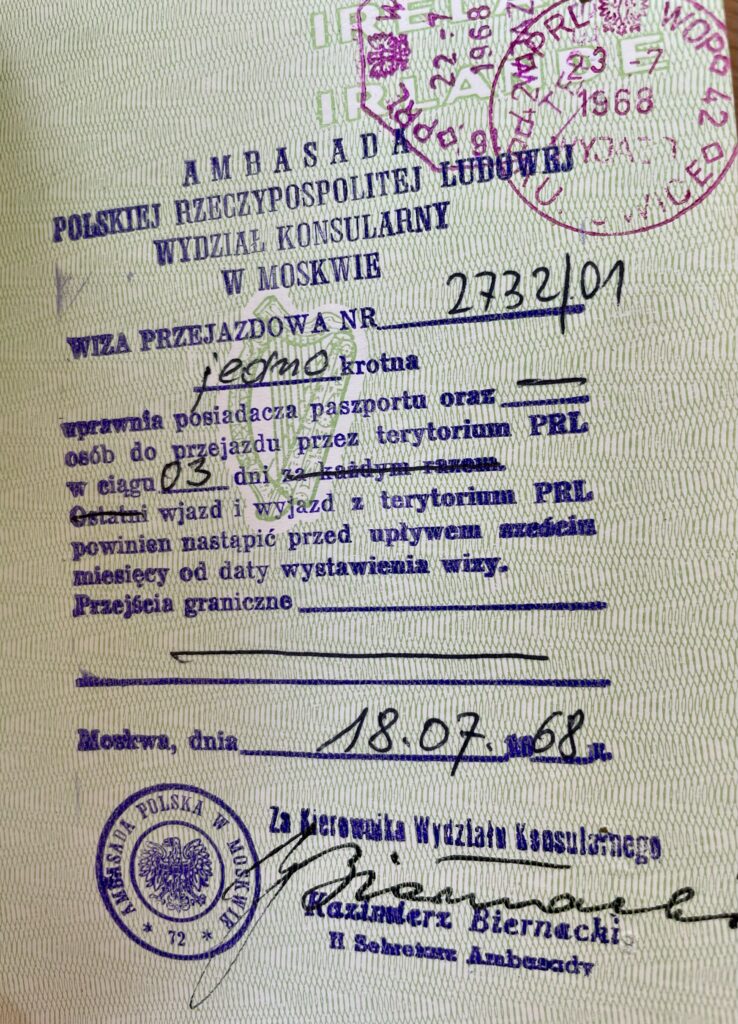
We reach Koninen about 100 miles from Moscow. Here there is some industry. The appearance of the land changes as we head for the steppes. No pine trees now, but there is more cultivation. We arrive at Moscow. It is pouring rain and most miserable.
Thursday 18th July : Lucy gives us a bus tour of Moscow. We pass museums a stadium and a university. There are pictures of Lenin from way above it. Lunch at 1.30. Moscow is a fine city with impressive buildings. People are dressed reasonably well. There are few cars on the city streets. Girls have a great interest in jewellery, nail varnish and so on. When a supply of these or of food or clothes, or indeed anything comes in there is a mad rush for them until all is sold, then nothing for how long no one knows. As rumour spreads queues form in anticipation of a coup. People spend ages waiting impatiently in lines, scuffles sometimes breaking out. Many shops have glaringly half empty shelves. That night we had a sing song at camp with lorry drivers. They sang some Russian folk songs. We sang a few Irish. We all joined in the Russian dances.
Friday 19th July : We left camp at 9.20. Many blocks of flowers to be seen. Much construction in evidence. Streets are clean. Very little décor. Matronly women are sweeping the streets and shoveling into garbage trucks. The official reason is that there is a shortage of men due to the high war casualties. There are no advertisements or neon lights on the streets. Now and then are pictures of Lenin,or muscular working men with shovels and hammers. Traffic is slow. Cars have dull colours. We are about to see the Berioska shops and the Metro. Yesterday we saw a long queue to visit Lenin’s tomb. It reminded me of the once in a lifetime journey made by Moslems to Mecca. There are only 100 cinemas in a city of 6½ million people. There are queues everywhere – for shops, trains buses, museums and so on. Many people on the streets. Yesterday we went into a large shop. On the walls were ornamentations and gilt paint, colonnades etc. It seems to have been a palace before the Revolution. There are many soldiers around the city. Very good flower beds. Went to the Berioska to day. Only hard currency is accepted here, especially welcome is the dollar and pound sterling. In fact on the black market you could get 3 times the going rate of roubles for your dollar. For my mother back home in Leitrim I bought a vase, for my sister a Matryoshka, for girlfriend Angela a silver bracelet with an amber pendant. For myself a slim-Jim watch. I reasoned that if the Russians could send satellites into space they could surely make a watch. Sadly I was to be disillusioned a year later when the hands fell off. The bracelet ended badly also when burglars made off with it and other jewellery. I also bought a vinyl record of Russian folk music. I managed t bring it safely home to Blessington. Lunch and then to “The Institute of Scientific Development for 50 Years”. It was housed in huge buildings with statues and pictures of cosmonauts and descriptions of their achievements. There were models of Sputnik, Bostoc, the dog Laika, the first animal to orbit the Earth. Years before we had traced Sputnik in the sky. It was truly amazing. Outdoors were models of spacecrafts. The construction was started in 1958 and wascompleted last year. Lucy was proud of Russian cosmology and informed us that any of us with cameras could take photographs. It is very impressive, of course, but so many billions for propaganda purposes, to prove that the Communist system is superior. And then you walk outside to deprivation and poor living conditions. Many houses could have been built with the money. Back to Hotel National.Cup of coffee with Liam and Patrick. They then went to a folk musical of some sort. I went down into the Metro. The Metro in Moscow is a showpiece. It has beautiful crystal chandeliers all over. All fares are 5 kopeks no matter how far you travel. I boarded a train for a few stops and was glad to be able to retrace my short trip. The names of the stations are in the Cyrillic lettering, so imagine if you took a wrong turn. After that I went into Gum, the largest department in the city. There were thousands of people milling around. Poorly dressed and no wonder when you looked at the price of things. A pair of socks was £1 and a few shillings. An ordinary cardigan was about £17.
Satudday 20th July : On the road at 9.00. Today we head for Red Square. There was as usual a queue going way back. But not for us. Lucy directed our driver up near the top. She got out and ordered those in the queue to move back. They did and we took their places. I often thought afterwards how unjust it was. As we moved forward a guard chastised a child and he in a raving temper. The guards continued to stare at us until we went down into the tomb. Four guards were at each corner of the tomb, some with small guns. Confrontation with any of the guards was obviously to be avoided. Stalin had been alongside with Lenin until Khrushchev exposed him for the tyrant he was. He was moved away a bit. We were about to go into the Kremlin but because of the incessant rain we took shelter in the Russian Hotel and waited for our bus at5.30. We had a great sing-song. Singers were Con, Bridin, Mary Bill, Dave Doc and me. I sang Moonlihjt in Mayo and The Black Hills of Dakota. When we struck up Lara’s Theme from Dr. Zvigago there was a palpable unease among our Russian friends.
Sunday 21st July : Today we travel from Moscow to Minsk. We are up at 6.00. Lucy took written questions from us. She avoided answering the reason for the Berlin Wall and the barbed wire between Russia and Finland and Russia and Germany. She answered what suited her. I had asked her why the shopkeeper should get paid when he had nothing to sell, or the ice cream seller with no ice cream. It seemed that people were just going through the motions. Alas no answer. Still raining at 1.20. Land is now much better. Wheat is growing in huge fields. The houses are better. Much grass to be seen. The German army passed through Minsk in WW2 and knocked much of the city. Russians have erected many new buildings and have done an excellent job. There is a remembrance construction in the centre. (It’s truly amazing how quickly cities can be rebuilt with a return to some sort of normality.) Minsk is in White Russia and is about the same size as Dublin. They have their own language, newspapers etc. and seem to have a measure of independence from Russia. Two lines of trees grow on the roadside. There are many pine trees.
Monday 22nd July : Left camp early. I woke at 5.00 from the cold. The White Russians are revolutionaries. We see huge concrete blocks being carried in lorries.
Stalin : Attitude has changed since 1956. There is more known about him now. He did great work leading leading up to WW2. with collectivisation of farms and the promotion of industry in the 5 year plans. But he tried to get rid of talented people and surrounded himself with enemies of the people. Many good people were killed. This contributed to the poor resistence of the Russian Army when the Germans attacked. In 1941 Stalin had received information that the Germans intended to attack, but he failed to act. After the war a Stalinist cult grew up and he became a dictator. Concentration, camps were filled often with innocent people. The Lubianka prison in Moscow was a place of absolute horror. Lucy gave us names of books to read, “One Day in the Life of Ivan”, and “Two Winters and three Summers”. In regard Collective Farms: farmers elect leaders who are in charge of running the farms. The State gets a percentage, the rest being divided according to the labour done by each farmer. Lucy continues: Jews get a fair crack of the whip in the U.S.S.R. They have religious freedom of worship, education as everyone else. Most live in Odessa, Leningrad and Moscow. The land now seems hard and dry with nt as much vegetation.
Brest has about 100,000 population. It was occupied by the Germans in WW2. Its fortress held out for one month until all its soldiers were killed. This is why it is one of 7 Hero Cities. (Holding out to the last man was a popular concept with some leaders in WW2. Churchill, for instance, advised the defenders of Singapore to hold out against the Japs to the last man, and castigated them for surrendering. In the event of a German takeover of the U.K. he himself had planned to continue the war from Canada. At the Siege of Stalingrad Paulus was elevated to the rank of Field Marshal, Hitler advising him that no German Field Marshal had ever surrendered. Paulus chose to ignore the implication, and went into captivity.) The city is well built up again.
Russian border we meet at 10.00. Lucy bids us farewell. Clocks go back 2 hours. The border guards have green caps and lapels and carry bren or sten guns. Their uniform is like that of an army officer. It takes 4 hours to get through both check points. We are now headed for Warsaw. There is a great difference in the land, with many more people living here. Many children out playing. Far more bikes. Agriculture is far more intensive than it is in Russia, with more wheat and potatoes. Faces are happy, perhaps because it is their Independence Day. Houses are small with hens, ducks, cows and horses all around. We pass a bicycle road race.That evening we vwnture into the city centre. We spotted a building with bars on windows and very evident bullet holes from the War. In a café people are dancing. A scrimmage breaks out between a man and his girlfriend.
Tuesday 23rd July : On the road at 6.30. Many men and women already working in the fields, women with stooped backs, men with scythes. Many horses and carts in one place as if there was a market. There are small paths going from the main roads into the fields, with little space between. Our sort of ditches do not exist there. You often see a cow tethered to a pole just as a goat might be in this country. Roads are good. There are good bus and train services. Some paving consists ofcobblestones and red bricks. Poles, like Russians, are eager to get their hands on foreign currency especially dollars. Trains are powered by electricity. Many orchards are in evidence. Poplar trees are plentiful. Ground plant like clover growing in abundance – maybe for cattle. We reach West Berlin and Wansee Camp. Liam under the weather
Wednesday 24th July : Up at 8.30, city at 10.00. Went into bank to change money to deutche marks. Handed in £2 Sterling and £1 Punt, Banc Ceannais na hEireann.. The teller rang up head officeand the Punt was accepted. This was the only bank on our travels who would honour it. I was impressed by German efficiency and courtesy.
We had to experience Checkpoint Charlie of course. Passing through it was intimidating as the East Berlin border guards were perched well above the crossing and their guns were pointing in our direction. The road across had many obstacles and zig zagged. Reckless drivers had tried to cross at speed from East to West. Few had made it. As usual documentation held us up for some time and we had to change a minimum sum of deutche marks into East German marks. This money had to be spent in the east. East Berlin was very backward compared to West Berlin. Things in shops were reasonably priced. Pictures were prominently displayed of Ulbricht, like Gomulka in Poland and Lenin in Russia. It was grand to be back in cheerful West Berlin again and the freedom, and the neon lights and the adds. This city is a shopper’s paradise. Its buildings look wonderful. Inside are escalators to make life comfortable. (Like elsewhere it is surprising how well it has recovered from the pounding it got in the war. The Marshall Plan ensured that West Germany was restructured in the most modern manner. The U.S. now understood that they would need a buffer in Europe to keep Russia at bay.The Brandenburg Gate was a great landmark and to trace the tram lines going right up to the ‘wall’ showed how arbitrary the Berlin Wall was. Later we would climb up a stairway to the top of the wall. This viewing point was well away from a border post. Inside the wall on the western side was a Russian War Memorial. Two Russian Soldiers guarded it. The pair looked a bit guilty, but nobody bothered them. Near the Wall was a Freedom Memorial in memory of those who were killed trying to escape or by accident. There are still some damaged buildings to be seen. Food and drink are very good and reasonable. We could see ‘the wall’ from our camp site. Last night we went to a Hausbrau and had a great night singing and drinking beer. A new church has been built on the site of the old Kaiser Wilhelm church (the lipstick and powder compact). The old ruined church was left as a reminder of the terrible consequences of war. The new building is lit up in a beautiful blue colour.
Thursday 25th July : Cards to be sent to several people back home. Left camp at 7.30. This journey to Amsterdam is very tiring, The roads in both Germanies are good. Good farms to be seen along the way. The buildings in Amsterdam are excellent.
Friday 26th July : Free morning in Amsterdam. The weather is good.
